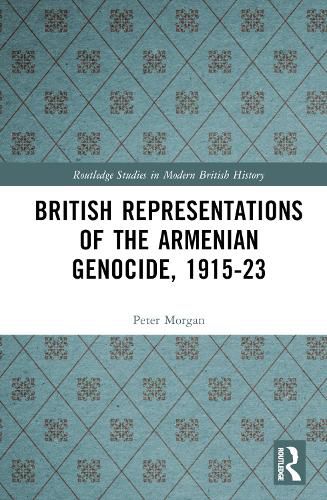Readings Newsletter
Become a Readings Member to make your shopping experience even easier.
Sign in or sign up for free!
You’re not far away from qualifying for FREE standard shipping within Australia
You’ve qualified for FREE standard shipping within Australia
The cart is loading…






This book examines how British politicians, national and local newspapers, writers and commentators discussed the mass killing and deportation of Armenians during the period 1915-1923.
Seeking to fill a historiographical gap in the field of modern genocide studies, this volume shows the extent to which the British public sphere understood the concept of genocide before the Holocaust and before the word itself was invented. It demonstrates the centrality of the British discourse on the Armenian massacres and deportations as they were happening during the First World War and how it came to be as important as that on German excesses in Belgium. This book reveals for the first time how the news was widely circulated in the provincial press and not just in contemporary major titles, and how it found its way into everyday conversation and the subject of an adventure novel. In analysing how the violence was viewed as an orientalist projection onto the Turkish 'Other,' this volume makes an important contribution to the literature on the more troubling side of the 'British Self' and imperial colonialism.
This volume will be of interest to undergraduates studying First World War Britain as well as researchers investigating the development of modern genocide and how it was discussed and conceptualised.
$9.00 standard shipping within Australia
FREE standard shipping within Australia for orders over $100.00
Express & International shipping calculated at checkout
Stock availability can be subject to change without notice. We recommend calling the shop or contacting our online team to check availability of low stock items. Please see our Shopping Online page for more details.
This book examines how British politicians, national and local newspapers, writers and commentators discussed the mass killing and deportation of Armenians during the period 1915-1923.
Seeking to fill a historiographical gap in the field of modern genocide studies, this volume shows the extent to which the British public sphere understood the concept of genocide before the Holocaust and before the word itself was invented. It demonstrates the centrality of the British discourse on the Armenian massacres and deportations as they were happening during the First World War and how it came to be as important as that on German excesses in Belgium. This book reveals for the first time how the news was widely circulated in the provincial press and not just in contemporary major titles, and how it found its way into everyday conversation and the subject of an adventure novel. In analysing how the violence was viewed as an orientalist projection onto the Turkish 'Other,' this volume makes an important contribution to the literature on the more troubling side of the 'British Self' and imperial colonialism.
This volume will be of interest to undergraduates studying First World War Britain as well as researchers investigating the development of modern genocide and how it was discussed and conceptualised.